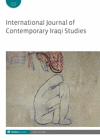- Home
- A-Z Publications
- International Journal of Contemporary Iraqi Studies
- Previous Issues
- Volume 7, Issue 3, 2013
International Journal of Contemporary Iraqi Studies - Volume 7, Issue 3, 2013
Volume 7, Issue 3, 2013
-
-
Adapting outdated content standards: Complications of teaching the Middle East in the California K-12 setting
More LessBy Barbara HallAbstractThis article examines why California secondary school teachers rarely include units on the Middle East in their classrooms despite the importance of the region in the world today. In order to explain this gap, it will consider the massive knowledge demands on history teachers, state and federal testing practices, content standards that define what teachers must cover and how the students and parents themselves all limit a teacher’s ability to include the Middle East in the public school classroom from kindergarten through grade twelve. After an examination of the issues involved, a few solutions are offered to assist in increasing education about the Middle East.
-
-
-
Minding the gap: Approaches to addressing the Middle East within the social science standards
More LessBy Amanda BushAbstractIn this article the author argues that the current academic standards for social science instruction in California are largely devoid of Middle East concepts and examination. While the standards are a guide for instruction, quality lessons can be inserted into the tenth-grade World History survey course as a start to move towards a more balanced global education. Through the use of primary sources and enrichment activities, students are exposed to major events such as the role of the Middle East in World War I, the creation of the state of Israel and the foundation of current world events. This article does not attempt to cover all major events in Middle East history for the past 500 years, but does offer solutions for teaching more enhanced Middle East content in the secondary classroom over the course of one academic year.
-
-
-
The human cost of war: Beyond the statistics
More LessAbstractAll too often historians get caught up in the facts and details of an event or period. Lists and statistics and dates overwhelm the human story which lies underneath. The use of oral history can help to keep the human element vibrant and at the same time make the factual components more relevant and intriguing to the modern young student. While true oral history has pitfalls as one is utilizing imperfect, fallible human recollection, such stories remain powerful and meaningful for the very reason of being the recollections of people – complete with depth of personality each of us brings to our experiences. The use of historical tales can retell an old story by adding characterization to give the modern student someone to connect with and perhaps make the factual story easier to understand and thus make use of when synthesizing events of history and how they interact over time. Examples are given to provide emphasis on the importance of daily experiences of the everyday person to the entirety of the historical tale. We matter as we are the history we create.
-
-
-
Elections as a tool for political participation in Iraq
More LessAuthors: Raad Sami Al-tmimi and Kevin E. GrishamAbstractElections are considered the main tool for political participation, because they lead to the peaceful transfer of power and establish the pillars of a stable society – justice, equality and respect for human rights. Free and fair elections in Iraq represent a massive step towards building a state and institutions based on human rights and good citizenship. Further, free and fair elections in Iraq are an effort towards upholding the concepts of freedom, equality and fairness. This article examines whether or not elections are the principal tool for ensuring political participation in Iraq. It will analyse the country’s experience of elections and its impact on political participation. Among the questions this article will address are the following: What are elections? Why are they important? What is political participation? What is its importance? How is it achieved? What is the relation between elections and political participation in Iraq?
-
Most Read This Month


